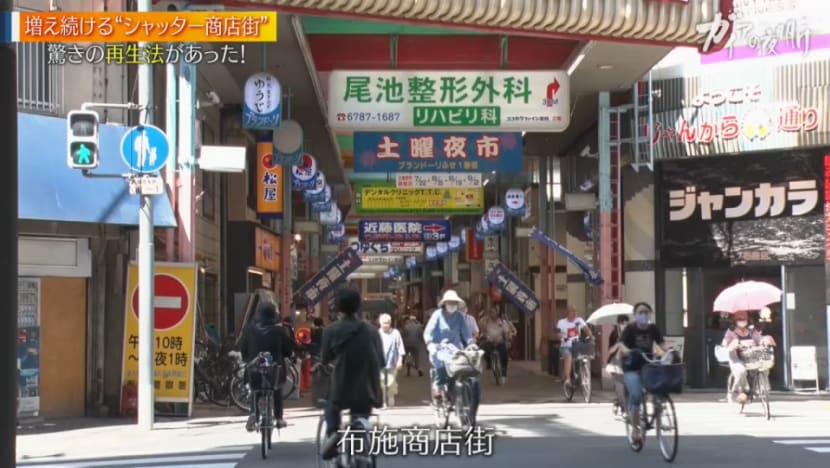Gaia Series 31: Revitalization Of Shopping Street
Innovative initiatives by Ject One and Sekai Hotel to repurpose and transform vacant spaces and properties, while revitalising local communities to foster unique experiences are featured this week.

In recent years, Japan has seen a rise in vacant homes and shops, with deserted shopping streets becoming more prevalent across the country. However, a unique initiative is breathing new life into these neglected spaces, transforming them into charming and bustling hubs that cater to the local community's needs.
One example is the Akisapo “vacant home renovation” project by real estate company Ject One. It was founded in 2009 and has an annual sales figure of 13.2 billion yen. Its headquarters are in Shibuya, Tokyo and it has around 100 employees. Ject One specialises in renovating and repurposing vacant properties, including detached homes, apartment complexes and derelict buildings. Over seven years, it has successfully renovated and rejuvenated more than 260 properties.
Under Akisapo, the company takes over vacant and unused properties, covers all the renovation costs and subsequently converts them into structures that suit the local area. The transformation involves not only enhancing the physical space but also understanding the unique characteristics and needs of the community. Kohei Yamashita is the team leader of the Akisapo initiative.
In Yokosuka City, Kanagawa, what was previously Miura Dry Cleaning, a place vacant for more than 60 years, has now become a shared kitchen hosting a different restaurant every day. The initiative has expanded to other places like Bunkyo Ward in Tokyo and Shibuya, where properties have been rejuvenated and repurposed, ranging from bars to creative spaces like art galleries. In a quiet residential neighbourhood in Yanaka, Taito Ward, Tokyo, Mr Yamashita worked on renovating wooden apartments - built more than 50 years ago - that were vacant for over a year. There were formerly 12 households living there. The company spent about 45 million yen on renovating the property.
In Yanaka - the city of art - Mr Yamashita converted a development near the art college into a shared house with unique artistic features. It also houses an art gallery, shops and restaurants. The aim was to attract students from the art college. The Yanaka property has become popular with youngsters and also foreigners.
Meanwhile, in Higashiosaka City, Osaka, Koichi Yano, the CEO of Sekai Hotel, took a unique approach to revitalise the Fuse Shopping Street. Fuse is the largest shopping street in the city. In the 1960s, it was bustling with nearly 800 shops and many customers. But in the past few years, the number of customers has dropped by about 75 per cent, while only around half of the shops remain open.
By converting vacant shops into hotel accommodations, Sekai Hotel provides guests with a "whole town hotel" experience. For example, the interior of a traditional sweet shop called Kawamachi was revamped into hotel rooms with a view of the shopping street. Sekai Hotel has also linked up with shops along the street and offers a Sekai Pass for discounts and bonuses on the shopping street.
Mr Yano has been in the real estate business for many years. He opened Sekai Hotel Fuse in 2018. The success of Sekai Hotel in Osaka led Yano to expand the concept to other cities, including Takaoka City in Toyama. The main street in front of the station here used to be very crowded with people 30 to 40 years ago but this is no longer the case. In December 2022, Mr Yano opened a Sekai Hotel at the former site of the Bunendo bookstore, which was popular in this area. Sekai Hotel Takaoka is managed by Daisuke Sumitani, who was born and raised in Takaoka.
Takaoka is known for its history, culture and technology. Mr Yano tasked Mr Sumitani with increasing the usage of the Takaoka Sekai Pass, the card that entitles the user to services and benefits on shopping streets. Mr Sumitani got down to work immediately. He visited a popular restaurant called Kazakura along the shopping street. Its most well-known dishes come from Toyama Bay. Mr Sumitani requested the eatery to create a special dinner plan for the Sekai Pass. He also went to a quaint shop, Jisaburo. Takaoka is famous for craft products made from bronze and tin. At this shop, visitors can experience creating tin bowls, offering them a new way to enjoy Takaoka.
Given that Toyama is rich in marine products, Mr Sumitani had another brainchild - to organise fishing trips for visitors so that they can catch their own fish and eat it after getting it prepared and cooked at an izakaya at the shopping street. Mr Sumitani also dropped by a store that sells a local Toyama delicacy, sliced raw fish with kelp. His idea was to get the store to prepare the freshly caught fish with kelp, which preserves it. Visitors can then bring it home as a souvenir.
After the success of implementing the Sekai Hotel model in Osaka and Toyama, Mr Yano envisions expanding the concept across the country, with a goal of at least 20 locations. He has set his sights on opening the next Sekai Hotel in Matsue City, Shimane.
Tips:
1) Adopt a community-centric approach when repurposing vacant properties
2) Consider collaborating with local businesses to revitalise an area or district












